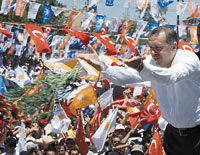Election fever in Turkey
 international |
anti-war / imperialism |
news report
international |
anti-war / imperialism |
news report  Saturday July 21, 2007 20:04
Saturday July 21, 2007 20:04 by MichaelY - iawm
by MichaelY - iawm
All bets on PM Erdogan getting an overall majority
For the last few weeks Turkey has become a poor man’s Hollywood, with much more intricate developments than the ‘Sopranos’, and with a whole load of pre-election and post-election political scenarios fighting for prominence.
.
The key question is whether PM Erdogan will get enough support without having to rely on other political forces and whether the personal support that he enjoys will translate to a parliamentary majority for his party.
In the elections due to take place tomorrow, Sunday July 22nd, 42.533.041 voters will cast their preferences in 158.700 polling stations spread in 85 electoral constituencies. There are 7.395 candidates standing for election,with 726 independents with the remaining belonging to 14 political parties. Polling stations will open at 7 in the morning and will close at either 4 or 5 in the afternoon, depending on their geographical area. Turkish law bans any publication of any exit polls or any discussion of the results until 21.00 hours
The latest polls show Erdogan’s governing Justice and Development Party (AKP – the acronym od which in Turkish translates as the ‘White Party') enjoying a substantial lead of 40-45%. It is followed by the Republican Popular Party with 19-22% while the extreme right wing Party of the Nationalist Movement enjoys the support of 9-12% of the lectorate. All polls indicate that it is only these three parties that will go over the threshold of 10% support necessary in order to be represented in Parliament. The members of the pro-Kurdish Party of Democratic Turkey will be participating in the election as independents.
The various scenarios feed off the facts mentioned above:
The first scenario would be for Erdogan to get an absolute majority which will elect over 367 (out of 550) members for his Party. If this scenario materializes, Erdogan will have absolutely no problem to have Gul, his Minister of Foreign Affairs, elected as President of the Republic and tampering with the Constitution in the process if necessary.
A second scenario would be the Justice and Development Party acquiring a relative majority of up to 276 members, at which point it would need the support of other political forces.
A third scenario would be the defeat of Erdogan by an alliance of the two other parties – this is however very unlikely as the independent Kurdish members, a good number of whom will be elected, will not co-operate with the extreme right. In fact, it is quite likely that the existence of the Kurdish independents may turn out to play a very crucial role if not in the formation of a government, but in many important parliamentary decisions requiring increased majorities.
The results of tomorrow’s elections will determine a number of key developments. First and foremost would be the question of the election of a new President of the Republic. The new Parliament which will convene about a week after the publication of the official electoral results will have to immediately elect its own Speaker and governing structure. Once this process is complete, the incumbent and outgoing President of the Republic will require from the majority party to form a government. It follows that this process will be somewhat straightforward if one of the parties has an overall majority; the question of possible alliances, on the other hand, will complicate this process considerably.
And immediately afterwards, the Parliament will have to confront the very thorny issue of the election of the new President of the Republic.
Presidential Elections
If Erdogan’s Party acquires an overall majority, the election of the new President would be a straight forward affair. The Justice and Development Party has proposed the current Minister of Foreign Affairs Gul as its candidate. However, if Erdogan’s Party does not acquire the overall majority, there arises the possibility that one of the other parties could block the election by simply abstaining from Parliament - as the Constitution requires that a minimum of 367 members of Parliament are present and vote for such an election. If Parliament cannot elect a President in four consecutive sittings, then it is dissolved and new parliamentary elections are held.
In the midst of all this, there is a Constitutional Referendum set for October 21st.There is no question that the political thermometer in Turkey will climb high over the next few weeks as a result of all these developments, particularly at a time that the country is facing a number of crucial and important crises.
A number of outside forces that are playing major roles in these developments, namely the USA, the European Union, Israel, Greece, Cyprus and the Arab world will be watching developments in Turkey with extreme interest and caution. Most of these forces would, in theory, prefer an Erdogan victory. However, under the Erdogan premiership, the EU/Turkey negotiations and the whole issue of Turkey’s involvement in the occupation of Cyprus have not moved significantly forward since 2004. Furthermore, Turkey’s continuing involvement in a guerrilla war against the Kurds and its recent incursions in and bombardment of northern Iraq have made the situation even more volatile.
To follow with extreme caution. Watch this space
